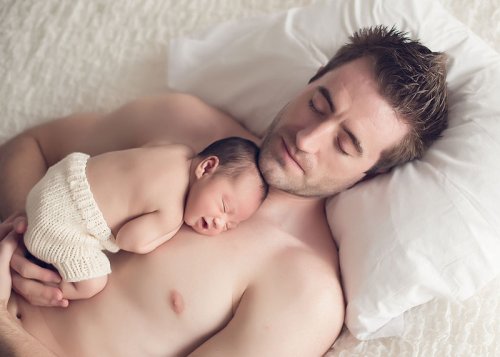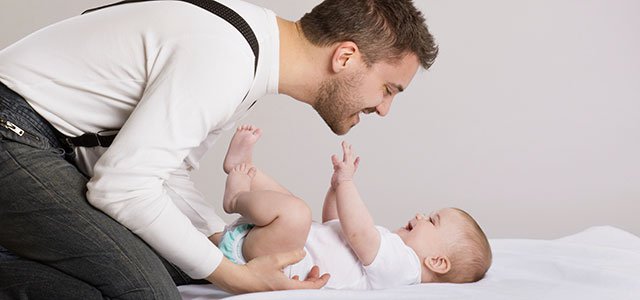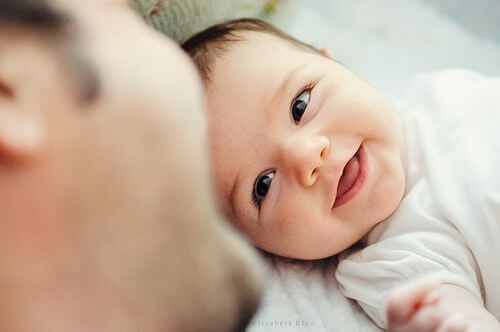The Father's Role in Child Rearing

Dads are a central figure in a child’s emotional and physical development. The father’s role during parenting helps children develop autonomy, encourages them to take responsibility, and to also discover the world freely.
The father’s role includes a number of crucial functions in the child’s life, which can be performed by the child’s father, the mother, a relative or, in some cases, an educational institution.
Before the baby is born, the relationship each parent has with their child materializes via the mother, who is naturally attached to the child during the gestation period. At that time, the father’s role is to support the mother, who undergoes many changes during this stage.
There is also a bond between the father and the baby while it is in the womb, especially if the father or father figure is actively involved during this period.
Once the baby is born, the father has the opportunity to bond with his child. This attachment relationship between father and baby is nourished by small acts that involve the father actively participating in simple tasks, such as carrying the baby in his arms and sleeping with him or her. Each time he does, the baby associates the smell and voice of his father with moments that make him feel safe and comfortable.

In this first stage of the baby’s growth, it is very important for Mom to leave room for Dad so he can also participate in raising the child. Because when the father actively participates in small daily tasks, the baby will recognize him as a figure of attachment, as a person who is trustworthy, who wants it and cares for it. These kinds of feelings help the baby build a solid foundation of self-esteem.
The father’s role is necessary as a third space apart from the “ideal world” in which the mother and child exist. It is necessary that this “third space” be present for the baby to grow.
The father is a model for the child
The father’s role, which is sometimes taken on by a man who is not the child’s biological father, does not go unnoticed in the eyes of the children. His presence, place and actions also nourish and define the personality of the child, who is learning things every day.
Providing a safe space is one of the most important functions of the parent, who is a figure of support and security for the child. This interaction helps the child to develop his personality with the confidence necessary to adapt to the outside world.
Taking on the constant challenge of being a present and active parent in your child’s emotional and social education will make a difference. This is a wonderful challenge that not only helps the child to grow but also helps him to grow as a human being in a balanced way, since one of the functions of the father is to offer the child a code that will serve as a moral compass.
The paternal figure helps to establish limits and norms and helps the child to establish patterns of social behavior.
A present parent makes a difference

A present and active parent is a central figure in the life of a child. If the bond is close, then the father is a person who can also transmit values, set limits and be heard by the child, who will be guided by a father who is increasingly involved in household chores and assumes the role of providing support along with the mother.
The authoritarian and distant role assumed by some fathers in the past has already fallen out of favor, replaced by a closer, warmer and more balanced role. Fathers today share many tasks with their wives, which include household chores, providing sustenance, paying bills and also being an active child rearing parent.
And men who take on all those roles, like changing diapers, washing clothes, feeding the baby and sustaining the household financially, play a fundamental role in the child’s emotional development.
Children whose father is very involved in their upbringing tend to perform better in life than those who did not have an active father figure during their child development. In addition, dads who are partners with the mother during a child’s infancy will also have key influence during adolescence.
Children who grow up without a father figure usually show disorders during adolescence because they do not find an identity. These young people may suffer from insecurity, loneliness and depression, which can be reflected in school failure, drug use and vagrancy.
All cited sources were thoroughly reviewed by our team to ensure their quality, reliability, currency, and validity. The bibliography of this article was considered reliable and of academic or scientific accuracy.
- Bowlby, J. (1986). Vínculos afectivos: formación, desarrollo y pérdida. Madrid: Morata.
- Bowlby, J. (1995). Teoría del apego. Lebovici, Weil-HalpernF.
- DE GENERO, E. I. LA EDUCACIÓN FAMILIAR EN IGUALDAD DE GENERO EN TIEMPOS DE PANDEMIA. https://institutomujer.castillalamancha.es/sites/institutomujer.castillalamancha.es/files/documentos/paginas/archivos/la_educacion_familiar_en_igualdad_de_genero_en_tiempos_de_pandemia.pdf
- Garrido-Rojas, L. (2006). Apego, emoción y regulación emocional. Implicaciones para la salud. Revista latinoamericana de psicología, 38(3), 493-507. https://www.redalyc.org/pdf/805/80538304.pdf
- Jorquera, S. A. Pandemia como oportunidad para criar conscientemente. https://geoconsulting.cl/wp-content/uploads/2020/09/COMP-Espan%CC%83ol-Pandemia-como-oportunidad-para-criar-conscientemente.pdf
- Marrone, M., Diamond, N., Juri, L., & Bleichmar, H. (2001). La teoría del apego: un enfoque actual. Madrid: Psimática.
- Moneta, M. (2003). El Apego. Aspectos clínicos y psicobiológicos de la díada madre-hijo. Santiago: Cuatro Vientos.